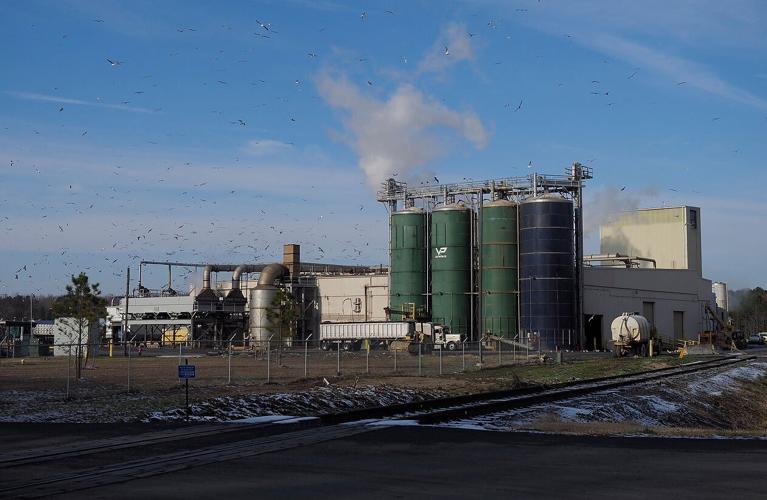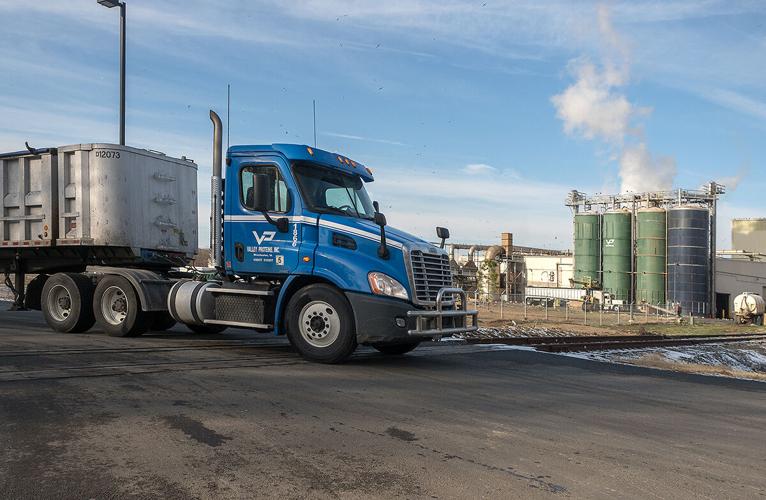After years of complaints from its neighbors, state regulators have ordered a controversial poultry rendering plant on Maryland’s Eastern Shore to curtail its pollution of a Chesapeake Bay tributary and say they will crack down on environmental violations there.
The Maryland Department of the Environment last week released a new draft wastewater permit for the Valley Proteins Inc. facility in Linkwood that would tighten limits on what it now releases after treatment into the Transquaking River.

Valley Proteins is a chicken rendering plant located east of Cambridge, MD.
“Our proposed actions mean cleaner water and a healthier watershed, with greater accountability for environmental violations,” MDE Secretary Ben Grumbles said in a Sept. 15 press release. The release said the agency would seek a “significant financial penalty” as well as corrective actions for a series of alleged water and air pollution violations at the plant.
Environmental activists welcomed the MDE’s announcement, but said it was long overdue.
“It’s good to see some movement to protect water quality,” said Matt Pluta, head of Riverkeeper programs for the nonprofit group ShoreRivers. “This is what we expected from them all along.”
Local residents and environmental activists have complained for years that the state hasn’t taken steps needed to improve water quality in the Transquaking, which flows through Blackwater National Wildlife Refuge before emptying into Fishing Bay and then the Chesapeake Bay just above Tangier Sound.
The river has been classified for more than 20 years as impaired by nutrient pollution. The rendering plant is the river’s largest single source of such pollution, which fuels algae blooms and reduces oxygen levels in the water below what’s healthy for fish and other aquatic animals.
The state has allowed the facility to operate under a discharge permit that expired in 2006, despite a federal law requiring such permits be renewed every five years. Pluta called it the oldest “zombie,” or expired, permit in Maryland. “MDE has let it continue operating without updated [pollution] controls for 15 years,” he said.

A truck leaves the Valley Proteins chicken rendering plant in Linkwood, MD.
In April, the Chesapeake Bay Foundation, ShoreRivers and Dorchester Citizens for Planned Growth jointly notified Valley Proteins that they intended to sue it for violating the federal Clean Water Act by repeatedly exceeding permit limits on its discharge of pollutants such as fecal coliform, nitrogen, phosphorus and ammonia.
The plant takes up to 4 million pounds of chicken entrails and feathers daily from poultry processing plants, according to MDE documents, and renders them into pet food. It’s currently permitted to discharge up to 150,000 gallons of treated wastewater daily, and it uses an air scrubber to control odors.
In the draft permit, the MDE has set caps on how much nitrogen and phosphorus the plant can discharge, regardless of volume. Those caps represent a 43% and 79% reduction from what is permitted now. To stay within those limits, the plant will have to upgrade its treatment, even at the current maximum discharge volume of 150,000 gallons per day.
But in 2014, the company sought state approval to increase its maximum allowable discharge to 575,000 gallons daily in order to expand production. Local residents and environmental groups objected, arguing that the facility already was polluting the water, and the issue has been unresolved until now.
Earlier this year, the MDE disclosed in budget documents that it intended to give Valley Proteins a $13 million state grant to help upgrade its treatment facility so it could reduce its nutrient discharge while expanding operations. The grant would have covered more than 80% of the estimated cost of the overhaul. It would have been the first such grant to a private company from the state’s Bay Restoration Fund, which has been used primarily to upgrade municipal sewage systems.
MDE officials contended that the grant was warranted because it would help the plant achieve enhanced nutrient removal in its wastewater treatment operation, the same standard applied to large municipal sewage plants. But the General Assembly cut the allowable grant amount to $7.6 million after critics contended that the private company based in Winchester, VA, could afford to pick up a larger share of the tab.

The headwaters of the Transquaking River flow near the Valley Proteins chicken rendering facility east of Cambridge, MD.
Now, though, amid allegations of pollution violations at the plant, the MDE has decided not to provide the grant to Valley Proteins.
“The company has a lot of explaining to do, and the competition for [Bay Restoration Fund] dollars among other applicants is continuing to grow,” Grumbles said in a statement emailed in response to queries.
The draft permit would give the company the option in the next few years to boost its wastewater output to accommodate increased production. But it would still have to adhere to the annual caps set on the amounts of nitrogen and phosphorus it can discharge. That would necessitate upgrades completely at the company’s own expense.
With the state grant off the table, Michael A. Smith, Valley Proteins vice chairman, indicated that the company would forego the overhaul the MDE says it would need to expand operations.
Instead, Smith said, the company plans to make less costly upgrades, which should be enough to meet the new nutrient limits with its current volume discharge.
“So there will be capital improvements but not to the magnitude it could have been had the funding come through,” Smith said.
Activists said they are guardedly optimistic but intend to keep pressing the MDE on tightening the permit.
“With an upgraded plant, we can expect lower levels of nutrients and [other] pollution,” ShoreRivers’ Pluta said. “We can only hope,” he added, that the plant does what’s needed to achieve enhanced nutrient removal.
Fred Pomeroy, president of Dorchester Citizens for Planned Growth, said he was pleased after years of advocacy to “finally get affirmation from MDE that the longstanding pollution issues will be addressed in the Transquaking River."
And Alan Girard, Eastern Shore director for the Chesapeake Bay Foundation, said activists were encouraged by the MDE’s announcement “after more than a decade of inaction. However, appropriate actions must be taken in response to the company’s repeated violations of the current permit and to ensure there is a commitment from Valley Proteins to comply with new pollution limits.”
The company has been fined a total of $5,000 over the last five years, according to a U.S. Environmental Protection Agency database. In the April notice of their intent to sue, the environmental groups said that public reports the company submits to state and federal regulators show the plant has repeatedly exceeded its discharge limits in recent years.
The groups also suggested that high nitrate levels found in monitoring wells may be from water leaking into groundwater from two wastewater storage lagoons on the property. They further alleged that the company hasn’t properly documented the tons of poultry waste sludge that is hauled away from the plant.
In its press release, the MDE said its investigators have found multiple infractions from July 2018 to the present. MDE spokesman Jay Apperson said those include exceeding currently permitted limits on several pollutants, plus an unauthorized discharge of only partially treated waste.
Also, in response to odor complaints, an MDE inspector visited the plant in August and cited it for an air pollution violation after finding fault with the operations and monitoring of its emission scrubber.
The draft permit includes updated groundwater monitoring requirements that the MDE said could provide more information about potential sources of pollution. It also contains more requirements for proper sludge management and reporting on its disposal.
“We are working with the facility, citizens and advocacy groups to ensure environmental progress using our regulatory enforcement tools,” the MDE’s Grumbles said.
The MDE has scheduled a virtual public hearing for 5 p.m. Oct. 20, with an in-person hearing at a date and place to be determined. To register for the virtual hearing, go here. The department will accept written comments on the draft permit if submitted by Dec. 15. For more information, go here, here and here.
Bay Journal staff writer Jeremy Cox contributed to this story.



(0) comments
Welcome to the discussion.
Log In
We aim to provide a forum for fair and open dialogue.
Please use language that is accurate and respectful.
Comments may not include:
* Insults, verbal attacks or degrading statements
* Explicit or vulgar language
* Information that violates a person's right to privacy
* Advertising or solicitations
* Misrepresentation of your identity or affiliation
* Incorrect, fraudulent or misleading content
* Spam or comments that do not pertain to the posted article
We reserve the right to edit or decline comments that do follow these guidelines.